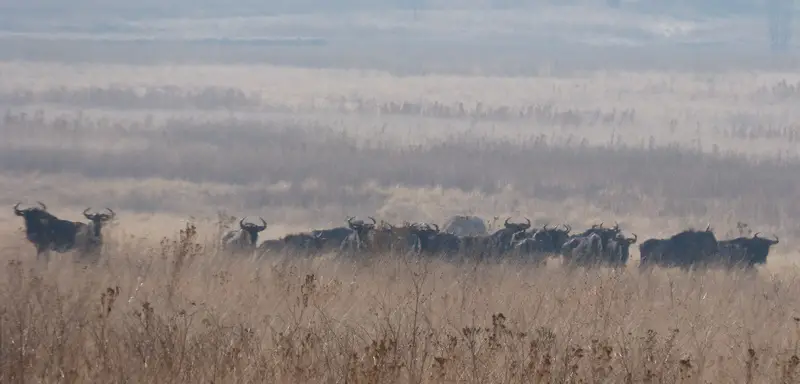


How Do You Want Animals to Die?

Photo by Randy Wakeman.
Whenever the topic of hunting comes up, unfortunately those knowledge of hunting is limited to MacDonald's and Kentucky Fried Chicken often respond with death threats. Yet, anyone with any basic knowledge of nature knows that Nature itself is often a cruel place. Nature is cruel to animals, beyond what most grocery shoppers have any concept of.
Starving to death
is a rough way to go. Yet, what exactly do intelligent people think actually
happens? While we all carp about rough winters, just what do self-proclaimed
“animal savers” actually do about it? Anything? For those with
an anti-hunting bias, what they are actually doing is “Saving Animals
to Death.”
Do you grow everything that you eat? Or, do you pay mercenaries to grow
it, farm it, or slaughter it for you? While it is more convenient to hunt
at the frozen food section, and often cheaper as well, just what is the
contribution to Nature or saving animals? How does that fund a Department
of Natural Resources, how does that protect habitat, how does that do
anything at all to insure healthy animal populations?
Many big game animals are quadruped grass eaters, the term ungulate roughly
meaning “being hoofed.” It was Herbert Spencer who coined the
term, “survival of the fittest,” in Principles of Biology (1864).
Animals, including the human animal, all die. It is merely a question
of when and how.
The young and the old are most likely to become victims of starvation, disease, predators, injury, and the elements. In other words, Nature. Once a grazing animal's teeth are worn to the gum line, the slow process of starvation begins. It happens daily, year-round. Just because we don't personally witness it hardly means it doesn't happen. If you are a U.S. taxpayer, you fund Wildlife Services, a branch of the U.S. Department of Agriculture’s Animal and Plant Health Inspection Service, a major force in eliminating wolf and grizzly bear populations in the continental United States. Today, the program spends over $100 million annually to kill more than one million animals. It is hardly sporting, for the use of two poisons for example, Compound 1080 and sodium cyanide M-44 devices, is just slaughter. You, the American taxpayer, are the ones that fund it.
But consider what legal hunting does. Instead of a grueling death by starvation or bashing and smashing animals with automobiles, the hunter pays for the privilege, hunting primarily mature, male animals only, taking them instantly, and filling the freezer. What does hunting do for wildlife? See http://www.fws.gov/hunting/whatdo.html. The answer is a whole lot.
What do hunters do for conservation?
A lot. The sale of hunting licenses, tags, and stamps is the primary source of funding for most state wildlife conservation efforts.
By respecting seasons and limits, purchasing all required licenses, and paying federal excise taxes on hunting equipment and ammunition, individual hunters make a big contribution towards ensuring the future of many species of wildlife and habitat for the future. By paying the Federal excise tax on hunting equipment, hunters are contributing hundreds of millions of dollars for conservation programs that benefit many wildlife species, both hunted and non- hunted.
Each year, nearly $200 million in hunters' federal excise taxes are distributed to State agencies to support wildlife management programs, the purchase of lands open to hunters, and hunter education and safety classes. Proceeds from the Federal Duck Stamp, a required purchase for migratory waterfowl hunters, have purchased more than five million acres of habitat for the refuge system (2005 statistics only); lands that support waterfowl and many other wildlife species, and are usually open to hunting.
Sportsmen contribute nearly $8 million every day, adding more than $2.9
billion every year for conservation.
Hunters and target shooters have paid $6.8 billion in excise taxes since
the inception of the Pittman-Robertson Act in 1937.
Hunting in America is big business, generating 600,000 jobs in the United
States.
For more than 80 years, sportsmen have paid more than $13.7 billion for
on-the-ground projects in every state, protecting our natural environment
and our fish and wildlife.
The $4.95 billion in annual federal tax money generated by hunters' spending
could cover the annual paychecks of 150,000 U.S. Army Sergeants.
That's just part of the story. See http://www.nssf.org/PDF/research/HuntingInAmerica_EconomicForceForConservation.pdf, consider the facts, do your own research, and you just might view things differently.
By far, the cruelest thing to do to wildlife in the United States, ironically, would be not to legally hunt them. It is hunter dollars that promotes wildlife health and enables wildlife survival.
Copyright 2014 by Randy Wakeman. All Rights Reserved.



